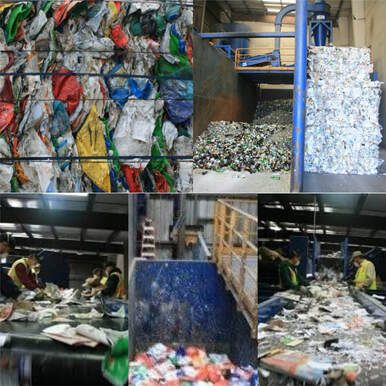 Scenes from Marin Sanitary Service in San Rafael.
Scenes from Marin Sanitary Service in San Rafael.
The folks at the Outdoor Art Club are hoping they can clear up some of the confusion by hosting a free “Talking About Trash” forum on Thursday, Jan. 30 at 1pm. The event features Jennifer Selvig of Marin Sanitary Service and Jim Iavarone of Mill Valley Refuse on the current state of trash in Marin County, including dual recycling, what can and can no longer be recycled, the growing focus on composting, evolving state laws and regulations, and how you can adapt your product usage and recycling for maximum environmental impact. Small kitchen composting buckets will be available at the event.
The global waste conundrum began when China invoked its “National Sword” policy in 2018, banning the import of most plastics and other materials headed for its recycling processors, which had handled nearly half of the world’s recyclable waste for the past quarter century, the recycling world in particular has been in a tailspin. The move was an effort to halt a deluge of soiled and contaminated materials that was overwhelming Chinese processing facilities and leaving the country with yet another environmental problem — and this one not of its own making.
Since then, the Mill Valley City Council unanimously approved a switch to dual-stream recycling services, backing a proposal by Mill Valley Refuse Service that its officials say has been driven by dwindling options for responsible, cost-effective disposal of paper, cardboard, plastic and glass materials.
“This is the future – we’ve got to be more responsible with our recyclables,” Mayor Jim Wickham said at the time.
“We all need to look at our recyclables as a product to make new stuff, so that the better shape we send it in the better quality of product we’ll get back,” added Councilwoman Stephanie Moulton-Peters. “The current situation is broken – it doesn’t work throughout the country. This is a very good effort to go back to what we were doing years ago. People can change their habits.”
In the aftermath of the National Sword policy invocation, China’s plastics imports plummeted by 99 percent, leading to a major global shift in where and how materials tossed in the recycling bin are being processed. That seismic shift has left waste management companies throughout the United States and beyond search for ways to dispose of all that recycling, with some ending up in landfills, incinerators, or likely littering the environment as rising costs to haul away recyclable materials increasingly render the practice unprofitable.
The end result has been skyrocketing costs. According to Mill Valley Refuse Service officials, the company saw recycling revenue shrink to zero in April 2017, and saw its per-ton fees to dispose of it elsewhere go from $4 two years ago to $59 to $72 to $83 today.
“Our efforts to find a better deal at various processing plants in the Bay Area failed,” says Iavarone. “Some plants closed their doors, while others refused to take on new customers. MVRS now dumps its single-stream recycling material at a transfer point at the Redwood Landfill in Novato, where it is loaded into semi-trucks and sent to a processing plant in San Jose.”
The company has identified disposing its recycled materials at Marin Sanitary Service in San Rafael, but that facility primarily processes dual-stream material, with paper put into one cart and all other recyclables into a separate cart. To test the willingness of customers to adapt to a dual-stream system, MVRS conducted a pilot project from September 2018 to December 2018. It released the results of that project in this report.
The 411: Outdoor Art Club hosts a free “Talking About Trash” forum on Thursday, Jan. 30 at 1pm. The event features Jennifer Selvig of Marin Sanitary Service and Jim Iavarone of Mill Valley Refuse on the current state of refuse in Marin. One West Blithedale Ave. MORE INFO.
And check out this New York Times video about what is and is not recycled after we toss it in the blue bin:
